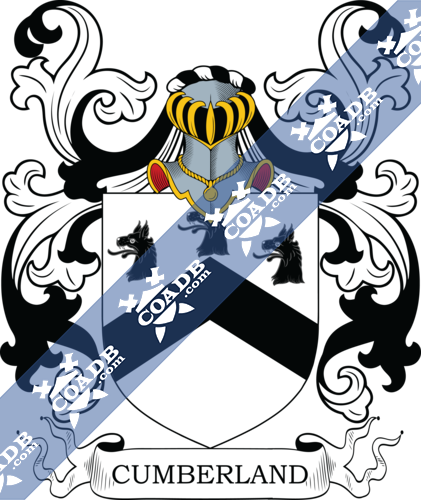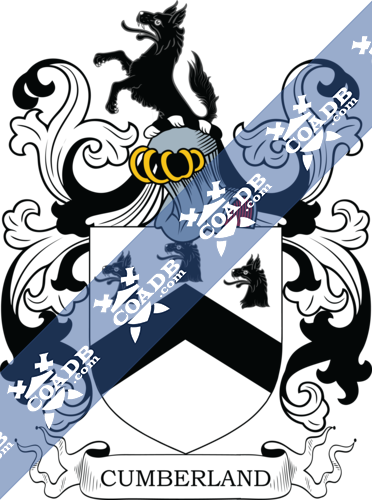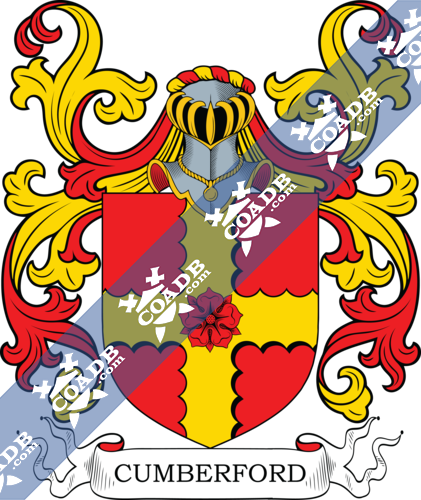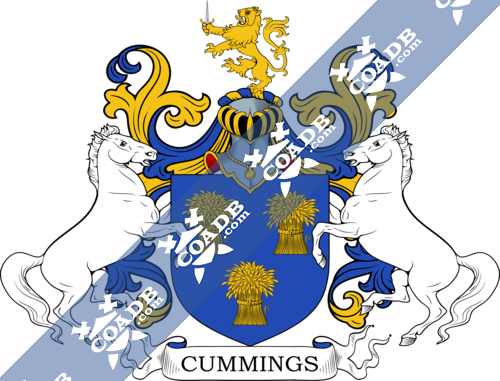Cumberland Family Crest, Coat of Arms and Name History

Cumberland Coat of Arms Gallery
Don’t know which Coat of Arms is yours?
We can do a genealogical research. Find out the exact history of your family!
Learn MoreCumberland Origin:
England
Origins of Cumberland:
It is an English geographical surname. It is an outstanding example of a ‘from’ surname, in that it is rarely if ever noted in Cumberland, itself before the 19th century. Geographical Surnames are frequently given to people after they departed from their real hamlet or district or even country. It being the easiest source of recognition to call a person by the name of their mother town, he or sometimes she arrived. The District of Cumberland was first noted in the year 945 A.D. in the popular Anglo-Saxon records, loosely if not too certainly explained as ‘the first newspaper.’ In those old days, the spelling was as ‘Cumbraland,’ which means ‘the Land of the Cumbrians’, which in reality were, the early Britons. The surname is then documented much later with Thomas Cumberland listed in the old parish records of the district of Greater London in 1548, while Richard Cumberland, was a witness at St Brides Parish, Fleet Street, City of London, in 1635. The first documentations of Cumberland in the district of Cumberland, was perhaps Peter Cumberland at Maryport, in October 1878.
Variations:
More common variations are: Cumerland, Cumerlnad, Kumberland, Comerland, Kummerland.
England:
The surname Cumberland first appeared in Cumberland, an old district of North West England that was located therein from the 12th century until 1974. The oldest record of the place was when it was recorded as Cumbraland in 945 in the Anglo-Saxon records and ultimately meant “region of the Cymry or Cumbrian Britons” from the Old English words Cumbre and land.
Ireland:
Many of the people with surname Cumberland had moved to Ireland during the 17th century.
United States of America:
Individuals with the surname Cumberland settled in the United States in two different centuries respectively in the 18th and 19th. Some of the people with the name Cumberland who settled in the United States in the 18th century included John Cumberland, who arrived in Virginia in 1705.
The following century saw much more Cumberland surnames arrive. Some of the people with the surname Cumberland who settled in the United States in the 19th century included Stephen Cumberland, who landed in Allegany (Allegheny) Division, Pennsylvania in 1816. Charles Cumberland who landed in St Clair Division, Illinois in 1858. William Cumberland who arrived in Philadelphia in 1873.
Canada:
The following century saw much more Cumberland surnames arrive. Some of the people with the surname Cumberland who settled in Canada in the 18th century included Robert Cumberland, who arrived in Nova Scotia in 1750.
Australia:
Some of the people with the surname Cumberland who settled in Australia in the 19th century included Josh. Cumberland at the age of 19, who was a worker, arrived in South Australia in 1853 aboard the ship “Macedon.” Eliza Cumberland at the age of 22, who was a farmer, arrived in South Australia in 1855 aboard the ship “Admiral Boxer.” John Cumberland at the age of 18, who was a worker, arrived in South Australia in 1856 aboard the ship “Nimroud.”
New-Zealand:
Some of the people with the surname Cumberland who settled in New Zealand in the 19th century included William Cumberland at the age of 30, who was a carpenter, Fanny Cumberland at the age of 24, William Cumberland at the age of 5, Fanny Cumberland at the age of 3, Clara Cumberland at the age of 1, all arrived in Wellington, New Zealand aboard the ship “Cartvale” in the same year 1874.
Here is the population distribution of the last name Cumberland: United States 2,658; England 984; Australia 405; Canada 369; South Africa 183; Jamaica 89; Northern Ireland 72; New Zealand 71; Scotland 59; United Arab Emirates 54.
Notable People:
Frederick William Cumberland (April 1821–August 1881) was a Canadian engineer, builder, and politician. He represented the riding of Algoma in the 1st and 2nd Ontario Parliaments and the Canadian House of Commons from 1871 to 1872.
George Cumberland (1754–1848) was an English art collector, author, and poet. He was a lifelong friend and follower of William Blake and like him was an experimental print manufacturer.
Richard Cumberland (dramatist) (1732–1811), was a civil servant and dramatist.
Richard Cumberland (philosopher) (1631–1718), was a priest and scholar.
Vic Cumberland (1877–1927), was an Australian Rules football player.
Blazons & Genealogy Notes
1) Ar. a chev. sa. in chief three wolves’ heads erased of the second. Crest—A demi wolf saliant sa. Another Crest—A hunting horn gu. betw. two wings ppr.
2) (borne by Richard Cumberland, Bishop of Peterborough, 1691-1718. The arms are on his tomb ,impaled with the arms of the See, in Peterborough Cathedral. Bishop Cumberland’s father was a tailor in Flect-street, London). Ar. a chev. and in chief three wolves’ heads erased sa.








